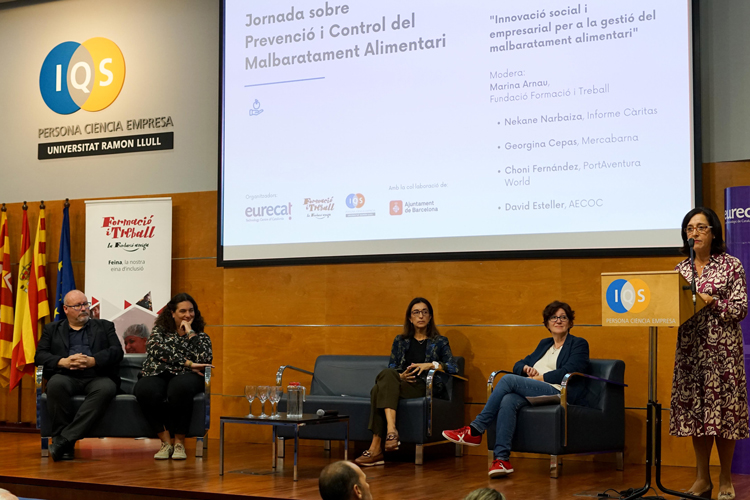On 17 October, the Chair of Tourism, Sustainability, and Innovation at IQS, along with the Eurecat technological centre and the Education and Work Foundation, in collaboration with the City of Barcelona, held an event on preventing and controlling food waste, bringing together professionals from the food, tourism, technological, and social sectors.

On 17 October, the Chair of Tourism, Sustainability, and Innovation at IQS, along with the Eurecat technological centre and the Education and Work Foundation, in collaboration with the City of Barcelona, held an event on preventing and controlling food waste, bringing together professionals from the food, tourism, technological, and social sectors.
According to data from the Ministry of Agriculture, Fisheries, and Food, Spanish households throw away an average 31 kilos of food per person annually. These figures mean that just over 1.3 billion kilos of food are wasted per year in Spain. Here in Catalonia, the figures are slightly higher, at 34 kilos of food wasted per inhabitant, adding up to over two hundred million kilos per year.
To analyse and debate the underlying causes behind these alarming figures, various experts from the food, tourism, technological, and social sectors met at the IQS campus, including Glòria Cugat, Deputy Director General of Agri-food Inspection and Control with the Government of Catalonia, Georgina Cepas, Head of Environment and Cleaning with Mercabarna, and Choni Fernández, Director of Central Services and Sustainability with PortAventura World.
In the first presentation of the day, Glòria Cugat highlighted the importance of teamwork "throughout the chain" as a fundamental factor to improve food management "from the field to the table". Cugat also referred to different Government of Catalonia initiatives such as the #JoEspigolo project to fight against wasting fresh products from the fields and to raise awareness and distinguish between the concepts of "best by" and "expiration" dates among producers and consumers.
Then, Meritxell Rota, Policy Analyst with the Advisory Council for the Sustainable Development of Catalonia (CADS), gave a presentation that focused on the importance of preventing food waste as a key factor for achieving the SDGs (Sustainable Development Goals), while emphasizing the "contradiction" between the fight against food mismanagement with "certain objectives" of the United Nations.
The first part of the event ended with a speech by Georgina Cepas, Head of Environment and Cleaning at Mercabarna. As the spokesperson for the Mercabarna wholesale market in Barcelona, and also the leading fresh food site in Europe, Cepas presented the Feedback project, the new centre for food use, which has been in place since February this year. This pioneering project manages surpluses in Spanish wholesale markets, taking advantage of organic plant matter to give a second life to surplus fruits and vegetables.
“Sustainability is sharing”
Next, Nekane Narbaiza, coordinator of the Cáritas report, gave a presentation during which she highlighted the organization's measures to prevent waste in their food distribution activities. Then, Choni Fernández, Director of Central Services and Sustainability at PortAventura World, spoke about the different initiatives carried out by the theme park to take advantage of products and reduce food waste.
Finally, Fernández highlighted the importance of cooperation as a key tool for achieving food efficiency and sustainability objectives. As an example of collaborative actions, she highlighted food surplus donations to soup kitchens near the theme park. "Sustainability isn't competing, but sharing," Fernández stated.
The roundtable events, one on social and business innovation led by Marina Arnau, co-director general of the Education and Work Foundation, and another on technological innovation led by Ignacio de las Cuevas, head of the Excellence in Tourism Innovation Centre with the Eurecat technology centre, addressed the role of technology and digitization in providing control and management tools. They highlighted the Sodexo WasteWatch project and the food measurement innovation at Ikea led by Winnow.










